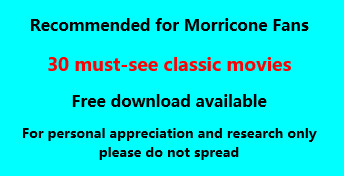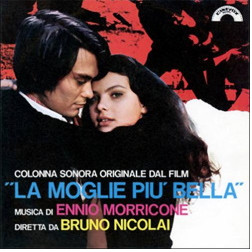LA MOGLIE PIÙ BELLA [THE MOST BEAUTIFUL WIFE] (1970)
La Moglie Più Bella is an Italian drama film directed by Damiano Damiani. The film looks at the concept of ‘fuitina,’ a formerly common custom in southern Italy in which a young woman would be kidnapped by a prospective husband and then forced to take part in a ‘matrimonio riparatore’ – a rehabilitating marriage – to her kidnapper. Specifically, the story examines the real-life case of Franca Viola, who became famous in the 1960s in Italy for refusing to take part in such a marriage after she was kidnapped as part of a fuitina plot, held hostage for more than a week, and raped numerous times. The film started Ornella Muti as Franca in her debut film role, Alessio Orano as her kidnapper, and Pierluigi Aprà as the Carabinieri lieutenant who investigates her case.
Morricone’s score is serious and dramatic, but still has some lovely melodic moments, and the whole thing is steeped in his style. The main theme, “La Moglie Più Bella,” is a combination of a standard orchestra, a twanging Jew’s harp, a cimbalom, and solo soprano vocals, all coming together to perform a strong, purposeful, determined-sounding theme that speaks to the resoluteness of Franca and her determination not to be abused. It has all the hallmarks of his spaghetti westerns, but it’s interesting how he was able to shift the focus to a more contemporary setting. The theme appears several times in the score; “Dramma Lontano” initially focuses on the familiar rolling pianos that have been a part of several Morricone scores, and surrounds them with thoughtful strings which eventually segue into a bold statement. Later, “Intimità” rearranges the theme for oboes and voice, “Sguardi Torbidi” is dark and arrayed with moody woodwinds and stark strings,
The twanging and boinging sound of the Jew’s harp is prevalent throughout much of the score, but what Morricone does with the orchestral parts around them changes significantly. For example, “Rapimento in Campo Aperto” and “Lupara” are full of strident, slashing strings and tempestuous percussion, while “In Campo Aperto” adds guitars and shrill whistles into the mix, as a well as a frantic tribal-style beat. I’m not sure what the boing sound represents in context but – and here’s a hot take – I personally think it undermines the seriousness of the story and feels like a rare tonal miscalculation on Morricone’s part.
Of course, this wouldn’t be a Morricone score without a lovely romance theme, and La Moglie Più Bella has several. “Vito e Francesca” takes part of the main theme and arranges it for soft strings, intimate pianos, and Edda dell’Orso’s unmistakable voice. The melodic highlight is undoubtedly the gorgeous “Tema di Francesca,” which again takes the thematic content from the opening cue, but presents is a tender, but slightly melancholy, lament that moves around from woodwinds to soft brass to strings and soprano, while the piano comments repetitively underneath. It’s really lovely, and it’s certainly a welcome break from the pinging and ponging elsewhere.
The score La Moglie Più Bella has been released several times. My personal preference is for the 2017 release from Italian label Cinevox, which builds slightly on their own earlier 1999, and has superior remastered sound.
Track Listing: 1. La Moglie Più Bella (Single) (2:09), 2. Rapimento in Campo Aperto (1:21), 3. Vito e Francesca (2:21), 4. Nascosto (0:28), 5. Dramma Lontano (2:36), 6. Intimità (1:18), 7. Lupara (1:06), 8. In Campo Aperto (1:42), 9. Sguardi Torbidi (1:37), 10. Ritrovata (1:22), 11. Tema di Francesca (Single) (2:52), 12. Amore Triste (2:02), 13. In Campo Aperto – Alternate Version (3:43), 14. Infinita Malinconia (2:20), 15. Tema di Francesca (Alternate Version) (2:22). Cinevox CDOSTPK-027, 29 minutes 19 seconds. |












